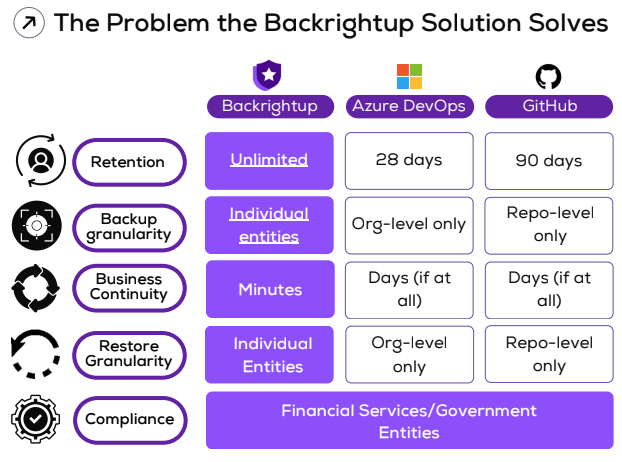The importance of robust backup and recovery solutions cannot be overstated. For users of Azure DevOps and GitHub, ensuring the safety and continuity of their repositories and projects is paramount. However, the native backup solutions provided by these platforms may not always meet the rigorous demands of various industries, particularly those with stringent compliance requirements such as financial services, healthcare and government entities. This is where Backrightup comes into play, offering a comprehensive solution that addresses the gaps left by Azure DevOps and GitHub.
We will unpack this image to help understand why Azure DevOps and GitHub users need proper backups, and how Backrightup supports this.

Retention Policies
One of the most significant differences between Backrightup and the native solutions offered by Azure DevOps and GitHub is the retention period. Azure DevOps offers a retention period of 28 days, while GitHub extends this to 90 days. In contrast, Backrightup provides unlimited retention. This means that with Backrightup, you can store your backups indefinitely, ensuring that you have access to your data whenever you need it, without worrying about it being automatically deleted after a set period.
Backup Granularity
Granularity in backups is crucial for effective data management and recovery. Azure DevOps offers org-level backups only, and GitHub provides repo-level backups. This limited granularity can be a significant drawback when you need to restore specific parts of your data. Backrightup, however, supports individual entities granularity. This means you can back up and restore individual projects, repositories, or even specific files, providing a much higher level of control over your data.
Business Continuity
When disaster strikes, the speed at which you can restore your services is critical. Azure DevOps and GitHub users might experience delays in recovery, with business continuity measured in days, if at all. Backrightup shines in this aspect by offering business continuity in minutes. This rapid response can be the difference between a minor hiccup and a significant operational disruption, ensuring your business remains up and running with minimal downtime.
Restore Granularity
Similar to backup granularity, restore granularity is vital for efficient recovery processes. Azure DevOps only supports org-level restores, and GitHub supports repo-level restores. Backrightup, on the other hand, allows for individual entities restores. This fine-grained control means that you can restore exactly what you need without having to revert entire organizations or repositories, saving time and reducing the risk of data loss.
Compliance
For industries such as financial services and government entities, compliance is non-negotiable. Backrightup meets these stringent compliance requirements, making it an ideal choice for organizations operating in regulated sectors. By ensuring that backups are handled according to industry standards, Backrightup helps organizations avoid costly fines and legal issues.
Conclusion
While Azure DevOps and GitHub provide essential services for developers and organizations worldwide, their native backup solutions may not fully meet the needs of all users. Backrightup offers significant advantages in retention, backup and restore granularity, business continuity, and compliance, making it an indispensable tool for any organization looking to safeguard its data. For Azure DevOps and GitHub users, adopting Backrightup can mean the difference between a vulnerable data management strategy and a robust, reliable, and compliant one. Consider integrating Backrightup into your backup strategy to ensure your data is protected and your business operations remain uninterrupted.
For a free trial visit www.backrightup.com
